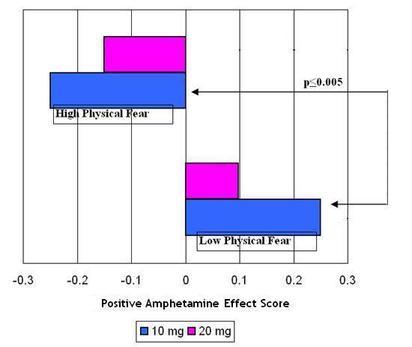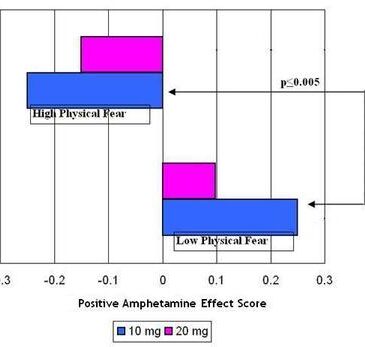Some scientists have speculated that substance misuse affects people differently depending on their personality (Nurnberger Jr et al., 1982; Reif & Lesch, 2003). This week we report on a study that examined the influence of personality-traits on individuals’ reactions to amphetamine exposure (White, Lott, & de Wit, 2006).
Participants: 128 healthy individuals recruited from the community
Experiment: In random order, researchers administered a placebo(1), 10mgs, and 20mgs of amphetamine to all participants, under double-blind conditions, over the course of three sessions separated by a minimum of 48 hours
Research Objective: To measure how personality traits (i.e., reward sensitivity, physical fear, and impulsivity) might moderate subjective responses to exposure to amphetamine
Measures: Multidimensional Personality Questionnaire-Brief Form (MPQ-BF) (Depue & Collins, 1999; Patrick, Curtin, & Tellegen, 2002; Tellegen, 1982)

Figure. Association between Physical Fear & D-Amphetamine. Adapted from: Figure 1: Trait physical fearlessness and positive activational responses to d-amphetamine. Higher-order positive drug effect (factor score) responses in participants with low [low physical fear] scores on MPQ-BF Harm Avoidance. Click image to enlarge.
Results, Figure 1:
- Individuals who scored low on physical fear had higher positive responses2 to low dose amphetamine compared to individuals who scored high on physical fear (p?0.005)
- Physical fear did not significantly effect responses to medium dose amphetamine
- Amphetamine response was not related to having high or low reward sensitivity or impulsivity
Main limitations:
- Self-reports of sensitive information might have introduced recall bias
- Participant similarities (e.g., educated, physically/psychiatrically healthy, relatively young) limit our ability to generalize the results
Discussion:
White et al.’s findings show that personality-related factors moderate the activational effects of one dose of amphetamine in healthy volunteers. The findings suggest that further research could help clinicians develop methods and materials to recognize whether and how personality-related factors influence addiction risk and recovery.
What do you think? Please use the comment link below to provide feedback on this article.
________________
[1] A substance containing no medication and prescribed or given to reinforce a patient’s expectation to get well.
[2] Positive Activational Responses were defined as: greater activation,
euphoria, vigor, arousal, elation, friendliness, and positive mood, and
less sedation and fatigue.
References
Depue, R., & Collins, P. (1999). Neurobiology of the structure of personality: dopamine, facilitaion of incentive motivation, and extraversion. Behavioral and Brain Science(22), 491+569.
Nurnberger Jr, J., Gershon, E., Simmons, S., Ebert, M., Kessler, L., Dibble, E., et al. (1982). Behavioral, biochemical and neuroendocrine responses to amphetamine in normal twins and ‘well-state’ bipolar patients. Psychoneuroendocrinology, 7, 163-176.
Patrick, C., Curtin, J., & Tellegen, A. (2002). Development and validation of a brief form of the Multidimentional Personality Questionnaire. Psychological Assessment(14), 150-163.
Reif, A., & Lesch, K.-P. (2003). Toward a molecular architecture of personality. Behavioral Brain Research, 139, 1–20.
Tellegen, A. (1982). Brief Manual for the Multidimensional Personality Questionnaire. . University of Minnesoata.
White, T. L., Lott, D. C., & de Wit, H. (2006). Personality and the Subjective Effects of Acute Amphetamine in Healthy Volunteers. Neuropsychopharmacology, 31, 1064-1074.




